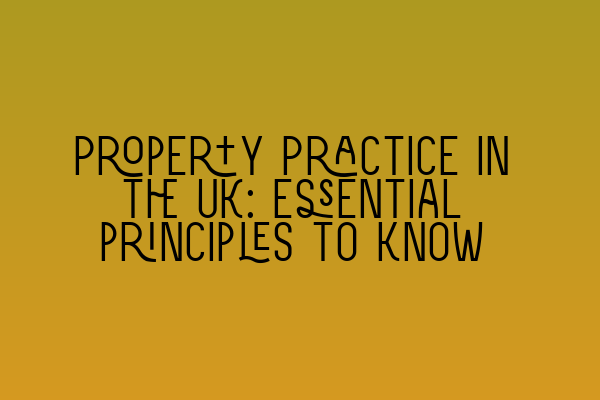Property Practice in the UK: Essential Principles to Know
At SQE Property Law & Land Law, we understand the importance of staying up-to-date with the essential principles of property practice in the UK. Whether you’re a solicitor, a legal writer, or an SEO expert, having a solid understanding of property law is crucial in ensuring your clients receive the best possible service. In this blog post, we will dive into the key principles you need to know to excel in property practice.
1. Understanding Property Law Basics
First and foremost, it is essential to have a strong grasp of the fundamentals of property law. This includes knowing the different types of property rights, such as freehold and leasehold, as well as understanding the concept of land ownership and the transfer of property. If you need a refresher on these basics, our SQE 1 Practice Exam Questions article is a great resource.
2. Conveyancing Process
Conveyancing is a crucial part of property practice, involving the legal transfer of property ownership from one party to another. As a solicitor, it is vital to be well-versed in the conveyancing process, including the drafting of contracts, performing searches, and ensuring a smooth transaction for your clients. Our SQE 1 Practice Mocks FLK1 FLK2 article provides valuable insights into the conveyancing process and includes practice exams to test your knowledge.
3. Land Registration
Land registration is an essential aspect of property practice in the UK. Understanding the Land Registration Act 2002 and the procedures involved in registering land is fundamental to ensuring the security of your clients’ property rights. Our SQE 2 Preparation Courses offer in-depth guidance on land registration and other property-related topics to give you a comprehensive understanding of this area of law.
4. Leasehold Law
Leasehold law is a complex area that requires careful attention to detail. As a property practitioner, you need to be familiar with the rights and obligations of both landlords and tenants, as well as the process of negotiating and drafting lease agreements. Our SQE 1 Preparation Courses cover leasehold law extensively, providing you with the necessary knowledge to navigate this specialized area effectively.
5. Property Disputes
Property disputes can arise in various situations, whether it’s boundary disputes, adverse possession claims, or breaches of contract. As a solicitor, it’s crucial to have a strategic approach to resolving these disputes and to be well-versed in the relevant legislation and case law. For guidance on handling property disputes, including exam dates and preparation tips, our SRA SQE Exam Dates article is a valuable resource.
6. Commercial Property
Commercial property transactions require a unique set of skills and knowledge. Understanding commercial leases, planning permission regulations, and tax implications is essential to providing comprehensive advice to clients involved in commercial property deals. Our SQE 2 Preparation Courses cover commercial property law in detail, equipping you with the expertise to handle these demanding transactions effectively.
Conclusion
Being well-versed in property practice is essential for solicitors, legal writers, and SEO experts at SQE Property Law & Land Law. By understanding the essential principles of property law, you can provide excellent service to your clients and excel in your chosen field. If you’re preparing for the SQE exams, our practice exam questions and mock exams, as well as our comprehensive preparation courses, will help you build a solid foundation of knowledge.
Remember, staying informed and continuously learning about advancements and changes in property law is crucial for success. Keep exploring our website for more resources and articles to enhance your understanding of property practice in the UK. Together, we can continue to deliver exceptional service to our clients in the ever-evolving world of property law.
